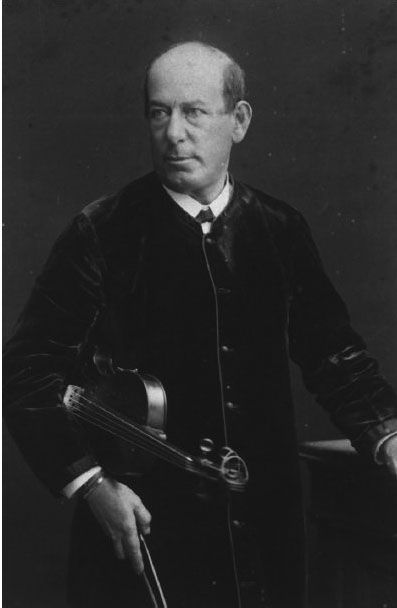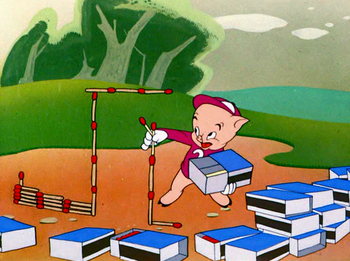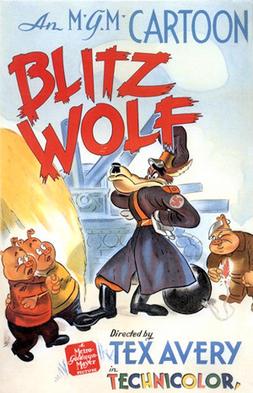A Year in Shorts Day 99: "Pigs in a Polka"
Although it might be hard to believe today, Walt Disney’s 1933 short Three Little Pigs was a blockbuster success, grossing 250,000 dollars in its theatrical run. How, exactly, the amount of money animated shorts made in those days was tabulated is beyond me; I’m an Oscar blogger, not an accounting historian. Although the Three Little Pigs are relatively obscure Disney characters now, they were bona fide superstars back in their day. So it was really only a matter of time before someone decided the pigs need to be taken down a peg or two; and it seems only fitting that pig’s pegs be taken down by the maestros of mayhem at Warner Bros. with the 1943 Merrie Melodies short, Pigs in a Polka.
Regular readers of The Great Oscar Baiter should by now be familiar with the name Friz Freleng, who helped develop some of Warner Bros. biggest stars. But for Pigs in a Polka, Warner Bros. wouldn't be working with any of their established stars; there isn't even a cameo from Porky, which certainly must have rubbed him the wrong way. But Porky's always kind of gotten a raw deal as far as the Looney Tunes are concerned. Oh sure, he get's to say "That's all folks!" at the end of every cartoon, but that always felt more like that purely ceremonial position you gave to an an aging executive who'd been with the company long enough to have their loyalty rewarded but whom you didn't actually want to have any real authority.
No instead, Pigs in a Polka relies on original characters (in a manner of speaking) to tell its story, all set to the tune of Johannes Brahms' "Hungarian Dances". You see, in addition to parodying Three Little Pigs, Pigs in a Polka also functions (somewhat) as a parody of Disney's Fantasia. I'm not sure Fantasia really needed to be parodied (and seeing as how it was a flop during that rare period of time in which Walt Disney Studios could conceivably lose money, it almost feels like they're kicking the while they're down), but to each their own. Really, it's all just an excuse to to once again trick kids into listening to classical music by putting it in their cartoons. Diabolical, I tell ya!
And as for the short itself? It's fine. It certainly isn't the best Warner Bros. short we've covered, but it's far from the worst. It's not particularly offensive or annoying, it's just sort of... there. The animation is decent, the gags are decent, and the music is very nice. But I feel like, as a parody, the bar you should at least be able to clear is that you're funnier than the thing you're parodying. That's really not a lot to ask; when Weird Al turned "Blurred Lines" into "Word Crimes", he made a much funnier (and much less controversial) song. But when you can't manage to make your parody funnier, it's just awkward for everyone. And that's how you wind up with songs like "Pretty Fly for a Rabbi."
As a parody of Three Little Pigs, Pigs in a Polka is something of a failure. Three Little Pigs may not have been the funniest Disney cartoon, but it's about as funny as Pigs in a Polka. Which is either a big compliment for Disney (whose cartoons were primarily valued for their artistry over their humor, especially in the 30s) or a damning indictment of Warner Bros., depending on who you ask. I suppose it's arguably more successful as a parody of Fantasia, in some regards. But even then, some segments of Fantasia are pretty funny, and "The Sorcerer's Apprentice" is easily a lot funnier than this short.
And you know what else was funnier than Pigs in a Polka? Der Fuehrer's Face, ANOTHER Disney short! And I think the Academy agreed, seeing as how that film won the Oscar that year. Although I suppose it's possible the wartime theme probably helped give Disney the edge that year. Now if only there were a movie released that year which combined the World War II propaganda and the story of the Three Little Pigs...
Well I'll be damned.
Keep up with the Oscar Baiting here on Letterboxd!
The Great Oscar Baiter is a not-for-profit work of criticism. All images herein are property of their respective owners and are protected under Fair Use.





Comments
Post a Comment